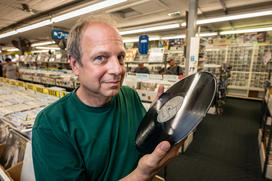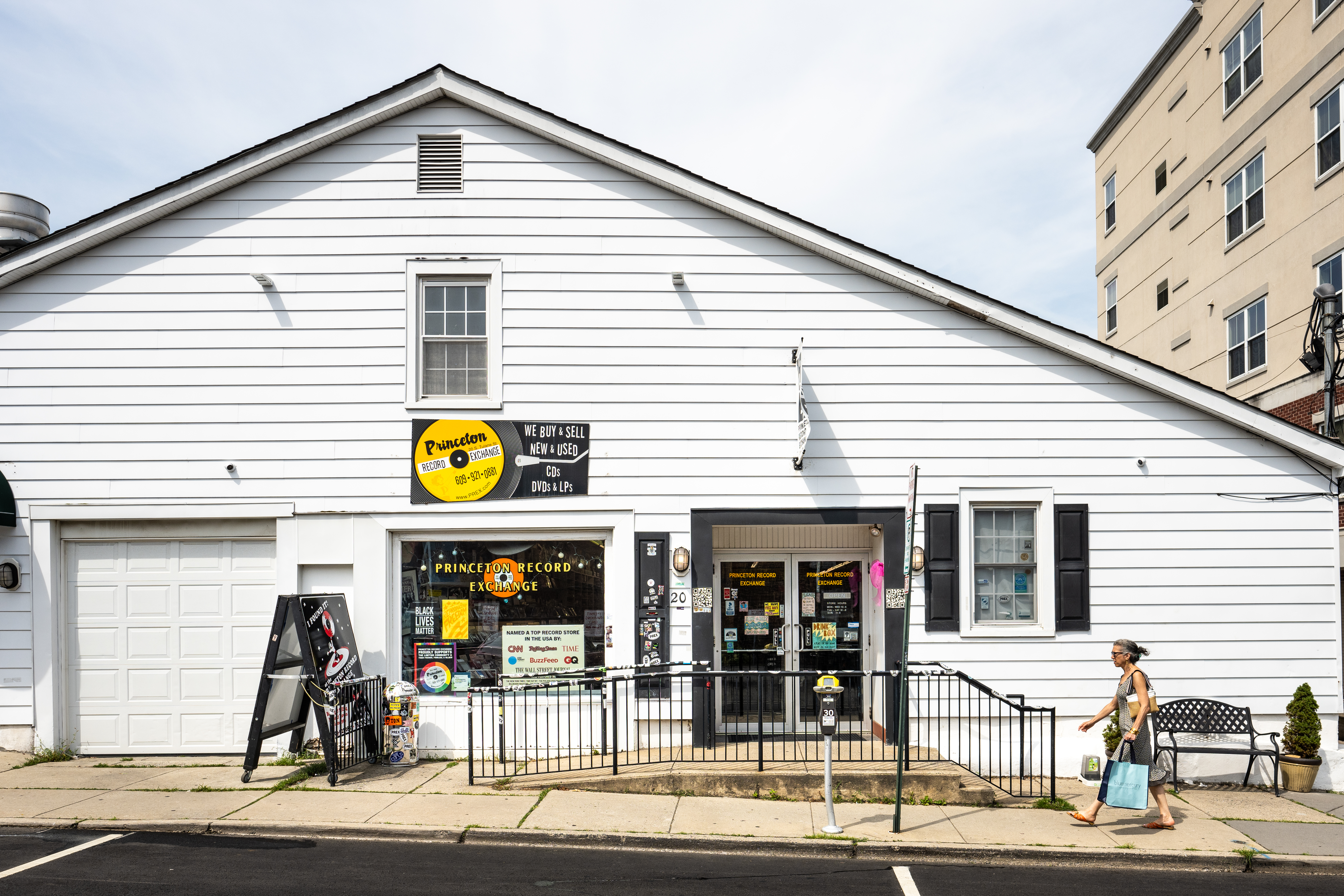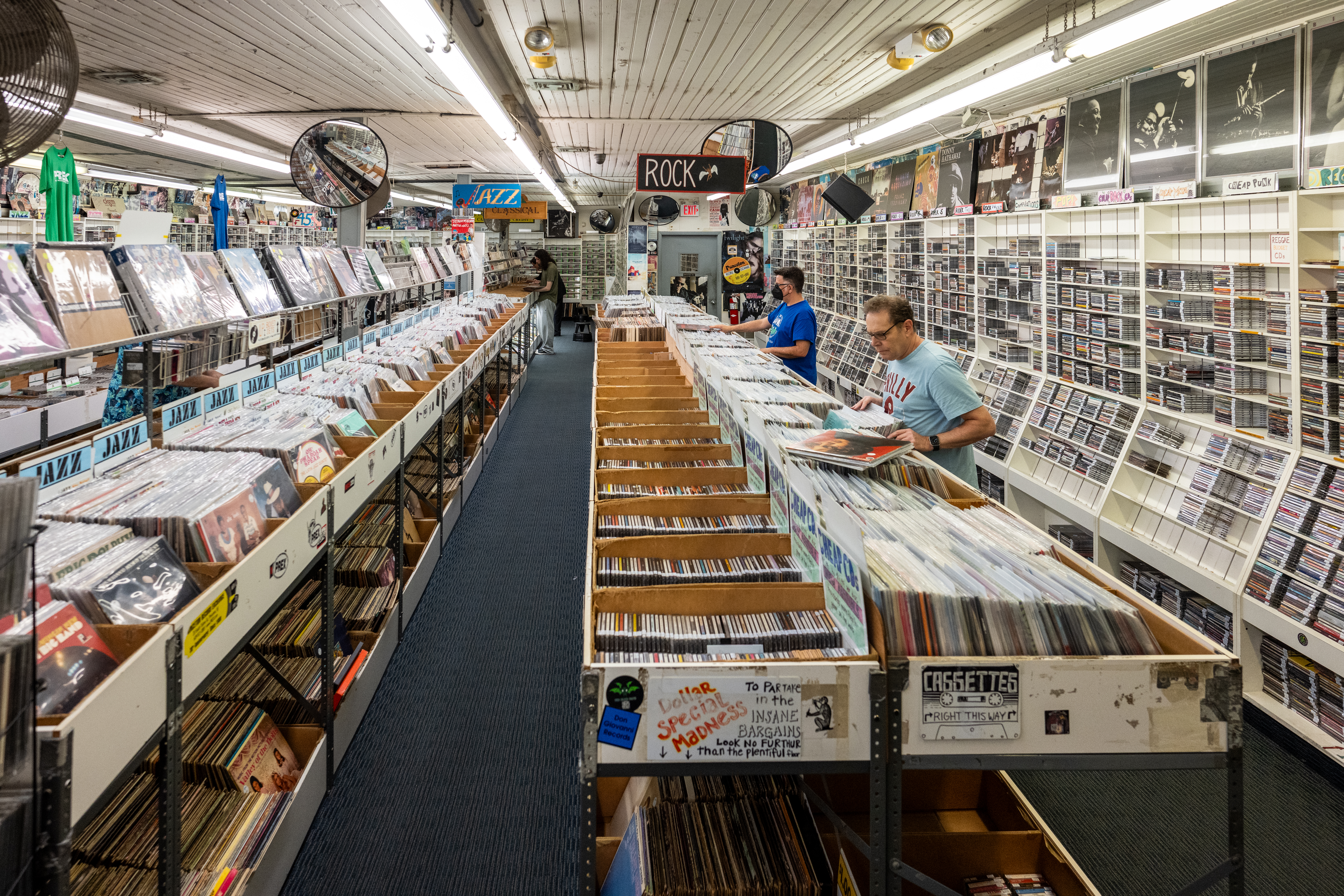
The Lasting Groove of Princeton Record Exchange
In honor of Record Store Day on April 12, PAW explores the history of PREX
Daniel Burke is a 68-year-old landscape architect from Ewing, New Jersey, whose passion for music goes back more than a half-century, traced to a Janis Joplin concert he attended when he was 14. Soon afterward Burke started buying albums, beginning with The Doors’ Strange Days and Jefferson Airplane’s After Bathing at Baxter’s. He has since added 8,700 more LPs to his collection, almost 90% of them purchased at one of his favorite places on earth, the Princeton Record Exchange, a deliciously low-tech destination for music-loving Princeton students — and many others — for 44 years. You can use the “download” word at PREX, as the shop is popularly known.
Just don’t say it too loud.
Located in an unprepossessing white building on South Tulane Street, just down from Princeton Barber Shop and the Japanese restaurant J.S. Foodies Tokyo, Princeton Record Exchange has some 130,000 albums and CDs tucked into most every crevice of its 4,000 square feet, in all imaginable categories, its ever-changing inventory encompassing artists ranging from Louis Armstrong to Led Zeppelin, Glenn Miller to Steve Miller, Jon Bon Jovi to Ludwig van Beethoven. Seventy-five percent of the music you find on its shelves is used. Thirty-five thousand items are bought and sold in the shop each month. There are over 5,000 LPs for $1, and an original album by jazz saxophonist Hank Mobley on Blue Note for $2,500. You never know what you are going to find at PREX, even if you are Daniel Burke, who is in the shop three or more times a week, and buys about 30 albums a month.
“I just go in and start leafing through,” Burke says. “It’s the thrill of the search. It’s like a treasure hunt.”
Jordan Becker ’82, a former program director at WPRB, has been a customer since Princeton Record Exchange founder Barry Weisfeld opened his first shop on Nassau Street, in a space not much bigger than a walk-in closet. Whenever Becker is in town, whether for Reunions or any other event, he often makes his way down South Tulane Street.
“I don’t think I’ve ever been there when there weren’t a lot of people in the store,” Becker says. Almost invariably, he will find a spare hour to browse through the offerings. Burke does the same thing. This is very much in keeping with Jon Lambert’s business plan.
“This is not a place where people come in, get what they want, and leave,” Lambert says. “Most people come in and stay awhile.”
Lambert has worked at Princeton Record Exchange since 1988 and has been the man in charge for the last 22 years — 14 as manager and the last eight as owner, having purchased the business from Weisfeld in 2016. He has 17 staffers, 12 of them full time, and makes it a point to hire people who know their music and create a welcoming in-store vibe where a common love of music, in all forms, is the currency. The vibe includes décor that Lambert describes as “college-dorm chic,” a visual overload of record promotional materials, buttons, postcards, flyers, and vintage, 50-year-old posters of Chicago and Randy Newman, among others. “There’s a lot to look at in here. Some would say too much,” Lambert says, but there’s no doubt the whole package works, playing no small part in PREX having $2 million per year in gross revenues. And in making PREX one of the premier independent record stores in the country, as judged by Rolling Stone, CNN, BuzzFeed and GQ, to name a few.
“I’ve seen Princeton Record Exchange shopping bags on the walls of record stores in Seattle as memorabilia — that’s how (well-known) it is,” says James Palmer, 30, an avid LP collector who says he has purchased as many as 2,000 of his 16,000 albums from PREX’s dollar bin. “You can find some absolutely incredible things there.”

Jon Lambert was born in New York City to parents he laughingly describes as “beatniks,” his mother a writer, his father an artist who played the bongos at Greenwich Village coffee houses. “Somebody’s got to play the bongos,” Lambert says. Music was a fixture in the family home and remained so when his parents moved to Princeton. Lambert attended Princeton High School, where he was a gifted student, a National Merit Scholar semifinalist — and a dropout at age 17. “School wasn’t a good fit,” he says, smiling faintly. He got a job as a clerk in a record store in a mall and became the manager at the age of 20. He eventually got his GED and worked a few more jobs in retail before learning from a friend about an opening at Princeton Record Exchange. Lambert set up an interview with Weisfeld, but when the store that employed him gave him a promotion and a hefty raise, he decided there was no reason to show up for the interview. Two years later, he heard of another full-time opening at PREX, and this time he did show up. The interview began with Weisfeld asking Lambert why he bailed on him two years ago.
“He forgave me, which was nice of him,” Lambert says.
Lambert worked his way up to manager just as Weisfeld, who started the business in 1975, selling records out of his van at flea markets and then taking his wares on the road to college campuses, decided he wanted to step back from the store. This coincided with a seismic shift in the music business, hastening the demise of such major record chains as Tower Records and Sam Goody’s. With more and more people downloading their music, profit margins got slimmer, and then record companies banded together to change their return policies, no longer taking back merchandise that hadn’t sold. Independent stores such as PREX were happy to fill the void.
Fifteen years ago, CDs accounted for 70% of Princeton Record Exchange’s sales, vinyl 25%. In 2024, those numbers reversed, a stark turnabout brought on by what’s known in the record business as the “vinyl resurgence,” a trend that goes far beyond the well-heeled precincts of Princeton. According to data from the Recording Industry Association of America (RIAA), between 1992 and 2007, vinyl never made up more than 0.3% of total revenues. By 2023, vinyl sales had increased 18 consecutive years and were at their highest level since 1984. Vinyl sales have outpaced CD sales for the last four years — and were 2.5 times more valuable in 2023, when CDs generated $537.1 million in sales and LP sales surpassed $1.35 billion.
What’s behind the vinyl renaissance? Music aficionados speak of the warmth of the sound from vinyl as compared to the early incarnations of CDs, which could sound harsh, but Lambert thinks in this digitalized, Spotify-ed world, more and more people are looking for full engagement, a tactile experience that begins when you pick out a record, slide it out of its cover and sleeve, dust it off and put it on the turntable, then sit back and enjoy it with cover art and liner notes nearby.
“And that album is going to play the songs in the order that the artist wanted you to hear them,” Lambert says. “For me, as someone who loves art, the single stream of business has always been frustrating because the artist takes a lot of time and care in producing those records, whether it’s a CD or an LP, in the way that they want it to go together. It’s not just hitting a button and playing a song . . . next, next, next, next. It’s a work of art that should be experienced. The vinyl ritual helps lean into that.”
On a typical Saturday, about 1,000 customers will stop by Princeton Record Exchange. Lambert believes that Princeton’s iconic, eminently walkable downtown, populated mostly by independently owned and operated stores, is a perfect fit for his clientele. His customers — an increasing number of whom are millennials and Gen Z types, including a regular influx of Princeton music majors — seem to appreciate the browser-friendly ambience and the serendipity that comes with never knowing what you will find. Lambert’s business modus operandi is the answer to the quintessential brick-and-mortar, downtown-retailing question: How do you stay relevant in a digital, download-driven age of instantaneous purchases and immediate gratification?
Sitting in a back office where PREX’s new inventory is sorted, near a wall of keepsakes that include a Certificate of Appreciation from the mayor of Princeton and a facsimile of an album on a turntable that pronounces him the recipient of the “Self-Directed Learning Award,” Lambert is talking with a visitor about how many regular customers he sees — and how he believes the success of the operation has everything to do with community.
“What can I offer that the internet can’t?” he says. “Well, I can offer a space. I can offer something physical, a place where you can touch things, you can look at things, you can smell things, you can talk to real people. You can hear real music in a real space. We give people a sense of belonging to a musical community, that they’re of like-minded folk here.”
Adam Sanders ’25, station manager of WPRB, sees PREX as a vital “contributor to the culture of Princeton as a center for new and experimental music,” and a store that shares a similar musical sensibility with the station, which explains why WPRB is a sponsor of PREX’s events for Record Store Day — this year on April 12 — each spring. WPRB regularly sells albums and CDs to PREX, and times its annual membership drive to coincide with Record Store Day. It’s the store’s busiest day of the year, one that draws over 1,000 customers, including some who camp out on South Tulane Street the night before. Last year, the first customer staked out his spot 23½ hours before PREX opened.
“It has been a long, symbiotic relationship WPRB has had with Princeton Record Exchange,” Sanders says. “We’re happy (the store) is here. We love going there because we both represent something off the beaten track.”
Nearly five years after the onset of the pandemic, Lambert can laugh about the debacle that was March 20, 2020, when COVID-19 forced the store to shut down. “I popped the cork on a bottle of champagne to celebrate our 40th anniversary, and the next day I had to fire everybody,” Lambert says. He continued to pay his employees’ health insurance, and the store reopened several months later, albeit with masking and safety protocols in place. Everybody got rehired. Now the vinyl resurgence continues apace, and the constant churn of new inventory never stops, and customers like Daniel Burke come and stay awhile, because what’s better than a treasure hunt?
“It’s a great joy to go to Princeton Record Exchange,” Burke says.








1 Response
Erica Duke Forsyth ’08
8 Months AgoDinner and a CD
I loved the article in the June 2025 PAW about PREX. It took me right back to a first date I had during the fall of our senior year. We had just finished dinner at Mediterra, and I think it was his idea to take a walk over to the Princeton Record Exchange. We were probably both eager to share our extremely cool, very underground music taste. We decided to each blindly pick out a CD to purchase. That night, in the family’s white Toyota Sienna minivan that he had on campus, we blasted one of the albums: Berlin Serengeti by Radio Citizen. It became the soundtrack of our early relationship. Eighteen years later, we’re still together, now vibing to new music with our two sons — minus the minivan.